
Background information
«I’ll fix it someday. I swear I will.»
by Michael Restin

How does one become a bartender? What makes a good bartender? And what does mixing cocktails have to do with cooking? Rebekka Salzmann from the Angels' Share bar in Basel tells us.
"What is Aperol, anyway?" With this question ended a search of several years. Rebekka Salzmann's search for her future path in life. She quickly found the answer to the question, but what followed has now taken a good five years. Rebekka's path from a searching young woman who didn't know what to do in life to one of the best bartenders in Switzerland.
The search began during her apprenticeship as a painter in Thun, where she grew up. Even before her final apprenticeship exam, it was clear that she would probably never work in this profession for health reasons. So what do you do when you're almost 20, have completed an apprenticeship, but are still facing professional nothingness again?
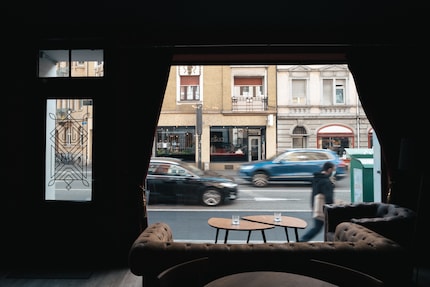
Rebekka searched. She attended business school and realized she didn't fit into an office job. She did internships in cleaning, lingerie and the hotel industry. "I just muddled through, did a lot of things simply for the money," she says looking back. Where that would lead her, she didn't know.
Her search became more focused when she did a service internship in a staff restaurant. She then worked in service for three years. During this time, her interest in spirits and drinks awakened. That's how the all-changing question finally popped into her head: "What is Aperol, anyway?"
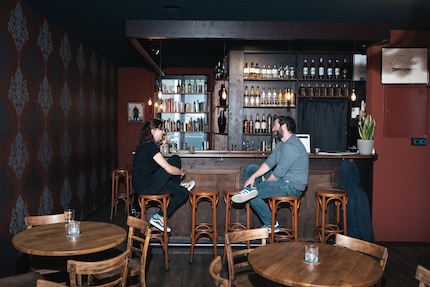
Rebekka, how did you get into cocktail mixing? There's no apprenticeship or professional training for it.
At first I just started for myself, bought two or three books and started learning on my own. Then I was just lucky at first. There was only one cocktail bar in Thun, the Atelier Classic Bar, and they had advertised a job. Ivan Urech gave me a chance - one that I hadn't really expected myself. He noticed that I didn't know anything yet, but that I was very interested and eager to learn. Then he trained me for about two, two and a half years.
He sent me to workshops, gave me topics for lectures, and took exams with me. But a lot of it was also just my self-study. I must now own 40 to 50 books on cocktails and cocktail culture.
In the beginning there was this question about the Aperol. A fascination arose from that. And then? Self-initiative and "learning on the job"?
Yes, definitely. It was really learning by doing. The first three months in the studio I just did service until I was sure I knew all the recipes by heart. I studied at home in the afternoons with index cards. But through the service I was also constantly dealing with the cocktails in everyday life and was already able to apply what I had learned.
What is it that makes you so fascinated?
There is certainly the contact with people, making them happy with what I do. When I serve someone a drink in the evening after a shitty day and they give me a compliment, I immediately feel better. And then the whole world of spirits interests me a lot. It's such a wide field and you never stop learning. It's constantly evolving and new products are coming out all the time.
And now you're a bartender for life?
(laughs) Yes! Definitely. That's exactly what I was looking for.
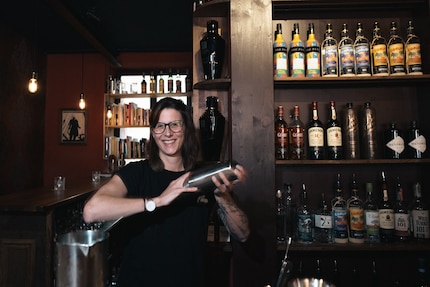
Working in the studio was one part of Rebekka's new path. Entering numerous mixing competitions was the other. While the Atelier is heavily focused on classic cocktails, Rebekka had to create her own drinks for the competitions. Out of this creative work came a desire for a change. "I was happy at the Atelier. But I wanted to move on," she recalls.
After about two and a half years in the Thun bar, she started looking for new opportunities. She found them in Basel. Here she has been working in the bar Angels' Share for a good two and a half years. The pure opposite of the Atelier. Much smaller, more intimate and with a monthly changing menu of her own creations.
Rebekka Salzmann and the Angels' Share, it clicked immediately. In the fall of 2019, they both cleaned up big at the Mixology Bar Awards in Berlin, with Rebekka winning "Newcomer of the Year" and Angels' Share winning "Bar of the Year".
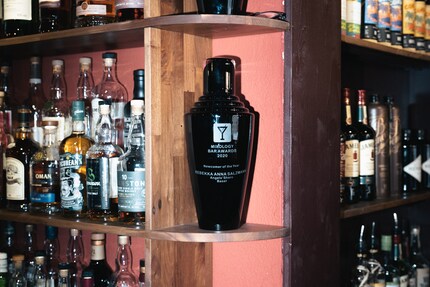
You've made the journey from classics to your own creations. So you also prefer the latter as a bartender?
No, you can't say that. I like both. I really appreciate being able to try so many things here. But I also think it's important not to forget the origins of cocktails and to mix the classics regularly. You always have to master those, too. Even if it happens that you have to quickly look at the recipe for a drink that is only ordered once or twice a year. I think both are important: innovation and tradition.
How do you go about developing a new menu?
Seasonality is certainly a big issue. We make sure that we use products or flavors that fit the season. A strawberry drink in December would be weird. It would be possible, but as a customer I would also find that strange. We also try to buy as locally as possible. Sure, we can't always do that. But, for example, we have vodka from a small distillery in Basel. We're happy to pay a few francs more for that, because you can't get it everywhere.
I've started to look into aromas and their combinations. A book about food pairing is currently my favorite. It's very much about culinary art and the question of which flavors go well together. Currently, for example, we have a drink with porcini mushroom and apricot on the menu.
I've seen it. The layman asks himself: How do you get such flavors into a drink?
There are two ways. Either you put a flavor carrier in a spirit until it takes on the flavor, or you make a syrup out of it. We work a lot with homemade cordials, which are syrups that have acid added to them. You can do that with pretty much anything.
You mentioned food pairing. Can you explain in more detail what you get out of it?
For me it's about developing professionally. Food pairing is specifically about understanding which flavors and aromas go together. With some things you know from experience. Apples and pears, for example. With many combinations, however, you wouldn't just come up with the idea that they go together. The porcini and apricot combination, for example. I would never have thought of that just like that. And there are plenty of combinations like that. Sometimes when I'm reading, I think, "Huh? Does it really fit?"
How did you get the idea to look around at culinary arts?
I had the aha moment at a restaurant when we ordered a surprise menu, so we didn't know what we were going to eat. There was an appetizer of beets and pears. Neither by themselves are favorites of mine now, but the combination of the two so blatantly floored me. The earthiness of the rim and the sweetness of the pear, it was a sensational combination. It made me think maybe I should look more into the kitchen as a bartender.
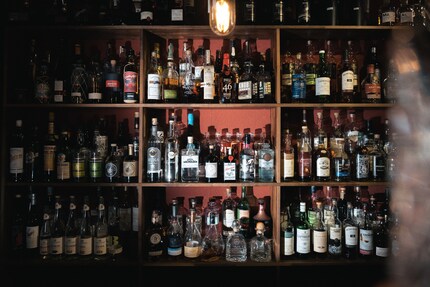
Do you also develop a drink like a dish in the kitchen, where you add different components bit by bit until it makes a round whole?
There are certainly similarities. We often start from the syrup or cordial and then go in search of the spirit. Vodka or gin almost always go. But whisky or cognac, for example, have more, and more importantly very different, flavors of their own and you have to look more closely at what goes with that. It's a process in which you put together individual flavour components.
How long does it take from the idea to the ready-to-serve drink?
It varies a lot. Sometimes you have an idea, try it out, and it works right away. Other drinks can take weeks or even months. Especially for competitions, I've worked on an idea for months and accumulated a mountain of paper with variations, ideas, mixing ratios. Often enough, ideas fail. You have an idea for a combination that you just can't get right, no matter how long you study and try it out. Sometimes, though, one of my colleagues has an idea for a twist - then it goes in a completely different direction than I imagined.
If I've had this porcini apricot drink and I'm dying to make it at home, do I get your recipe for it as a guest?
Yes! Always with us. We're very open about it and have no secrets. I'm sure there are bars that don't like to give out their recipes. But with us it happens really often that we are asked how we make our drinks. Especially because we always have something more special on the menu. I must have explained the porcini mushroom drink alone three times last week. I'm happy when people are interested.
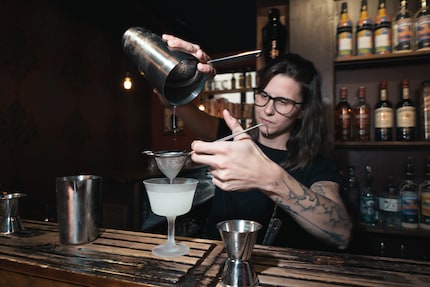
The awards for Rebekka and the bar have helped Angels' Share gain some notoriety. Media outlets have covered her and more, and more importantly, new customers have shown up at the bar.
That was in the fall and winter of 2019. Then came 2020, Covid-19 and the lockdown. Instead of benefiting from notoriety and popularity, the bar was closed from one day to the next. The future uncertain. When does it move on? How does it go on? Does it even go on?
As trite as it may sound, necessity is the mother of invention. This is also true for the bartenders of the Angels' Share. Instead of mixing extraordinary cocktails for guests every evening, they did so for a photographer. The idea: their own cocktail book about the bar and the drinks that have been created every month for the past five years or so (the book has not yet been published and will initially only be sold to crowdfunding supporters, the ed.). They've spent hours tweaking the perfect photo of a drink - which, with 100-odd drinks, gets pretty involved.
Another Corona project was the collaboration with the restaurant Klingeli in Basel. Just like in their own bar, the Angels' Share team created a new drinks menu every month with five cocktails to match the restaurant's menu. Particularly inspiring for Rebekka was the collaboration with the Klingeli's chefs. "If I got stuck on a recipe, I simply asked one of the chefs what might fit my ideas. That's when I always got really good new ideas."
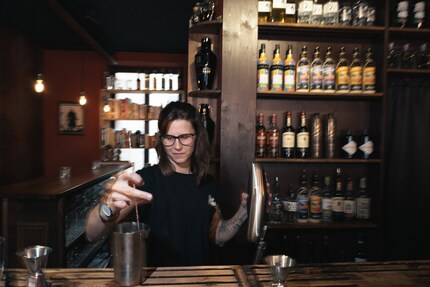
Speaking of food: People often make a distinction between the before and after categories when it comes to drinks. Why? Can't I have my favorite drink when I want it?
Those groupings do exist, but you can enjoy any drink at any time of day. Typically, pre-dinner drinks are the stronger and more bitter, like a Negroni. The bitter is meant to stimulate the appetite and open up the stomach. Classic after-dinner drinks are strong drinks like an Old Fashioned, which are meant to stimulate digestion, but also cocktails with cream, which can then already go in the direction of a dessert substitute. I wouldn't recommend such cream drinks for an aperitif. But a Negroni is also nice after a meal.
What about when I don't really know what I want? Can I just say "I want something with rum and it should be fresh" and then you improvise something?
That's actually almost our favorite thing to do. (laughs) Okay, maybe that's an exaggeration. But I do enjoy it when someone says I like this or that and would like a strong drink or a sweet one or something.
How experienced do you have to be to be able to come up with something spontaneously?
You definitely need experience. But if you have certain basic variations in there, you can play around with ingredients and try them out pretty quickly. Once you have the framework, you can start to vary the finesses or respond to customer requests spontaneously.
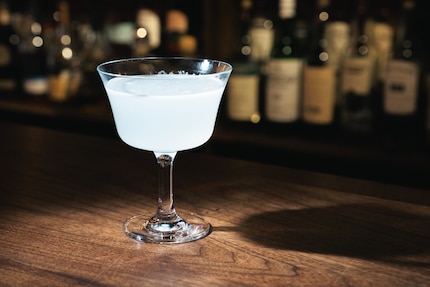
Okay, then I'll give you a few terms that are related to the Galaxus brand, what would your Galaxus drink look like? Colorful, playful, unconventional, valuable.
My latest creation fits these terms like a glove: bacon - tangerine. As I said above, you can put almost any flavour into a drink, and bacon is one of them. The drink is based on Rye Whiskey, which we flavored with bacon. The tangerine then goes into the drink in the form of a sherbet. A sherbet is sort of like a cordial. The peels of the tangerines are first soaked in sugar to release the essential oils. The resulting thick syrup is then triggered with the juice of the fruit. This produces a syrup with acidity.
To this is added lemon juice and ginger ale. The complete drink is filtered with soy milk at the end. These types of cocktails are called "Milk Punch". This is one of the most elaborate drinks we have on the menu at the moment, but in return it is anything but ordinary. The slightly smoky flavours from the bacon together with the fresh and fruity flavours of the tangerine harmonize perfectly - or to put it another way: this combination is colourful, playful, unconventional and worthy.
By the way, if you've been waiting all this article for the resolution to the opening question, here it is: Aperol is an Italian bitter liqueur. It has a bright orange color and is drunk pure, as a spritz or in cocktails.
Globetrotter, hiker, wok world champion (not in the ice channel), word acrobat and photo enthusiast.
Interesting facts about products, behind-the-scenes looks at manufacturers and deep-dives on interesting people.
Show all